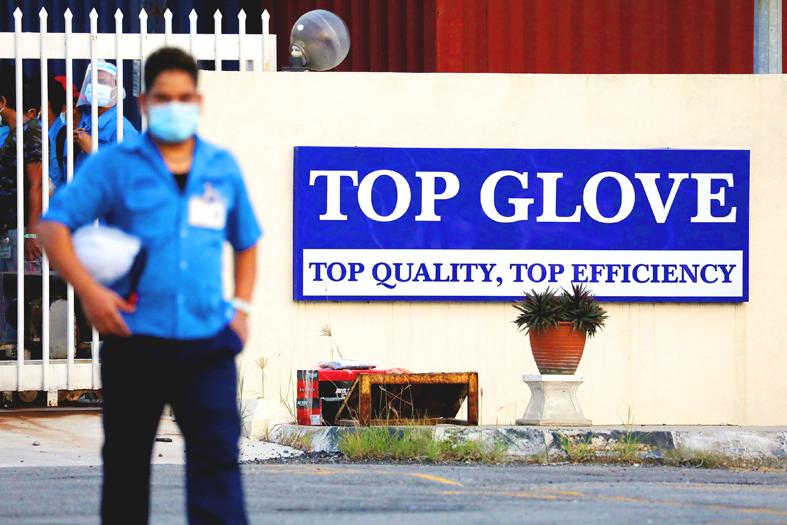Top Glove Corp’s stock yesterday sank after the US Customs and Border Protection (CBP) ordered personnel at US ports of entry to seize its gloves made in Malaysia, putting pressure on the world’s biggest glove maker to improve its labor practices.
The company’s shares tumbled as much as 5 percent in Kuala Lumpur to the lowest level since March 3. It is down 21 percent this year, among the largest decliners on the main equities gauge. Its stock listed in Singapore was halted for an announcement, according to an exchange filing.
The move is a blow to Top Glove and comes as Malaysia’s main industries — palm oil and gloves — come under intense scrutiny for poor labor practices.

Photo: Lim Huey Teng, Reuters
The CBP in December last year banned imports of Sime Darby Plantation Bhd, the world’s largest palm planter, citing allegations of forced labor. It took similar action on planter rival FGV Holdings Bhd.
The CBP Office of Trade, in consultation with the US Department of the Treasury, on Monday said that it imposed the penalties against the Malaysian firm after having found “sufficient information to believe that Top Glove uses forced labor in the production of disposable gloves.”
The order expands a directive last year banning imports from two units of the company.
The withhold release order that the CBP issued in July last year was based on reasonable, but not conclusive information that multiple forced labor indicators exist in Top Glove’s production process, it said.
“Today’s forced labor finding is the result of a months-long CBP investigation aimed at preventing goods made by modern slavery from entering US commerce,” Troy Miller, senior official performing the duties of the CBP commissioner, said in a statement.
North America accounts for 22 percent of Top Glove’s total sales volume, Kenanga Investment Bank Bhd said in a report yesterday.
Factories belonging to Top Glove were found to be a major source of COVID-19 infections in Malaysia last year.
The Malaysian government in November last year ordered the company to shut 28 of its factories in phases after discovering thousands of new cases there, and carried out raids on its dormitories. Its workers hail from countries like Bangladesh and Nepal.

SEEKING CLARITY: Washington should not adopt measures that create uncertainties for ‘existing semiconductor investments,’ TSMC said referring to its US$165 billion in the US Taiwan Semiconductor Manufacturing Co (TSMC, 台積電) told the US that any future tariffs on Taiwanese semiconductors could reduce demand for chips and derail its pledge to increase its investment in Arizona. “New import restrictions could jeopardize current US leadership in the competitive technology industry and create uncertainties for many committed semiconductor capital projects in the US, including TSMC Arizona’s significant investment plan in Phoenix,” the chipmaker wrote in a letter to the US Department of Commerce. TSMC issued the warning in response to a solicitation for comments by the department on a possible tariff on semiconductor imports by US President Donald Trump’s

The government has launched a three-pronged strategy to attract local and international talent, aiming to position Taiwan as a new global hub following Nvidia Corp’s announcement that it has chosen Taipei as the site of its Taiwan headquarters. Nvidia cofounder and CEO Jensen Huang (黃仁勳) on Monday last week announced during his keynote speech at the Computex trade show in Taipei that the Nvidia Constellation, the company’s planned Taiwan headquarters, would be located in the Beitou-Shilin Technology Park (北投士林科技園區) in Taipei. Huang’s decision to establish a base in Taiwan is “primarily due to Taiwan’s talent pool and its strength in the semiconductor

An earnings report from semiconductor giant and artificial intelligence (AI) bellwether Nvidia Corp takes center stage for Wall Street this week, as stocks hit a speed bump of worries over US federal deficits driving up Treasury yields. US equities pulled back last week after a torrid rally, as investors turned their attention to tax and spending legislation poised to swell the US government’s US$36 trillion in debt. Long-dated US Treasury yields rose amid the fiscal worries, with the 30-year yield topping 5 percent and hitting its highest level since late 2023. Stocks were dealt another blow on Friday when US President Donald

UNCERTAINTY: Investors remain worried that trade negotiations with Washington could go poorly, given Trump’s inconsistency on tariffs in his second term, experts said The consumer confidence index this month fell for a ninth consecutive month to its lowest level in 13 months, as global trade uncertainties and tariff risks cloud Taiwan’s economic outlook, a survey released yesterday by National Central University found. The biggest decline came from the timing for stock investments, which plunged 11.82 points to 26.82, underscoring bleak investor confidence, it said. “Although the TAIEX reclaimed the 21,000-point mark after the US and China agreed to bury the hatchet for 90 days, investors remain worried that the situation would turn sour later,” said Dachrahn Wu (吳大任), director of the university’s Research Center for